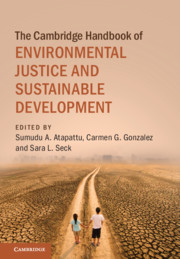Book contents
- The Cambridge Handbook of Environmental Justice and Sustainable Development
- The Cambridge Handbook of Environmental Justice and Sustainable Development
- Copyright page
- Contents
- Contributors
- Acknowledgments
- Foreword (on Living in an Interregnum)
- 1 Intersections of Environmental Justice and Sustainable Development
- Part I Frameworks
- Part II Case Studies
- Strategies, Challenges, and Vulnerable Groups
- Toxic Substances and Hazardous Wastes
- Resource Extraction
- Energy
- 22 Environmental Justice, Sustainable Development, and the Fight to Shut the Poletti Power Plant
- 23 The Indigeneity of Environmental Justice
- 24 Energy Poverty, Justice, and Women
- 25 Energy without Injustice?
- Climate Change
- Part III Conclusion
- Index
24 - Energy Poverty, Justice, and Women
from Energy
Published online by Cambridge University Press: 26 March 2021
- The Cambridge Handbook of Environmental Justice and Sustainable Development
- The Cambridge Handbook of Environmental Justice and Sustainable Development
- Copyright page
- Contents
- Contributors
- Acknowledgments
- Foreword (on Living in an Interregnum)
- 1 Intersections of Environmental Justice and Sustainable Development
- Part I Frameworks
- Part II Case Studies
- Strategies, Challenges, and Vulnerable Groups
- Toxic Substances and Hazardous Wastes
- Resource Extraction
- Energy
- 22 Environmental Justice, Sustainable Development, and the Fight to Shut the Poletti Power Plant
- 23 The Indigeneity of Environmental Justice
- 24 Energy Poverty, Justice, and Women
- 25 Energy without Injustice?
- Climate Change
- Part III Conclusion
- Index
Summary
The phenomenon of energy poverty, found among the poorest people in the world, profoundly and disproportionately affects women. Principles of law and justice call on governments and civil society to address this phenomenon. This chapter first discusses the importance of energy to development; it then discusses specific dimensions of energy poverty and its inordinate impacts on women; the chapter then explores the phenomenon of energy poverty as it applies to the use of traditional biofuels for cooking through three case studies spanning the globe. The next section examines the predicament of women through the lens of justice as articulated by John Rawls. This is followed by an examination of the implementation of the Sustainable Development Goals (SDGs), and relevant international legal provisions as they relate to the predicament of women. It concludes by asserting that the SDGs and international law have not been satisfactorily implemented, and this failure points to the importance of employing a Rawlsian sense of justice in the implementation of international law and the SDGs.
- Type
- Chapter
- Information
- Publisher: Cambridge University PressPrint publication year: 2021



